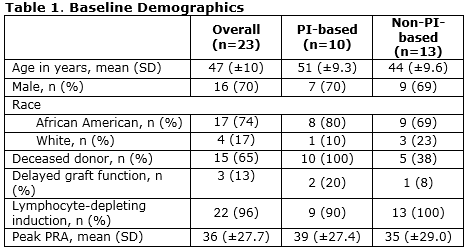Impact of Protease Inhibitor-Based Anti-Retroviral Therapy on Tacrolimus Intrapatient Variability in HIV+ Kidney Transplant Recipients
Houston Methodist Hospital, Houston, TX
Meeting: 2019 American Transplant Congress
Abstract number: B212
Keywords: HIV virus, Immunosuppression, Kidney transplantation, Rejection
Session Information
Session Name: Poster Session B: Kidney Infections
Session Type: Poster Session
Date: Sunday, June 2, 2019
Session Time: 6:00pm-7:00pm
 Presentation Time: 6:00pm-7:00pm
Presentation Time: 6:00pm-7:00pm
Location: Hall C & D
*Purpose: High tacrolimus (FK) intra-patient variability (IPV) has been associated with inferior outcomes in solid organ transplantation. HIV+ transplant recipients have been shown to experience higher rates of acute rejection, possibly due to the drug-drug interactions that exist between highly active anti-retroviral therapy (HAART) and immunosuppression regimens. In this study, we aim to determine the impact of protease inhibitor (PI)-based HAART regimens on FK variability and whether this affects overall immune outcomes.
*Methods: We performed a single-center review of HIV+ kidney transplant recipients from 2007 to 2017. Patients were divided into high or low tacrolimus trough level variability cohorts based on median % coefficient of variation [%CV = (σ/μ) x 100; σ, median; μ, mean]. Lymphocyte-depleting induction was administered to patients with the following characteristics: African American, PRA ≥20%, and/or re-transplants. All patients were discharged on tacrolimus, mycophenolate, and prednisone.
*Results: A total of 23 HIV+ kidney transplant patients were included, of which 10 were on PI-based based HAART. Baseline demographics are reported in Table 1. Median IPV at 6 months was 36%; rates of high IPV among PI-based vs. non-PI-based regimens were 60% and 38%, respectively. At 12 months, high IPV was observed in 70% PI-based compared to 31% non-PI-based patients. Overall rates of rejection were similar between groups. Of note, one patient was switched from PI to non-PI-based HAART due to an early acute rejection and another patient on PI-based HAART was switched to belatacept to avoid drug-drug interactions.
*Conclusions: Our data suggests that PI-based regimens may be associated with a higher degree of FK variability during the first year post-transplant. However, given the small sample size, we did not observe significant differences in immune outcomes between the two groups. Further studies are warranted to determine the impact of PI-based HAART on FK IPV and subsequent graft outcomes in HIV+ transplant recipients.
To cite this abstract in AMA style:
Cooper MH, Dunne IE, Kuten SA, Cantwell AE, Graviss EA, Nguyen DT, Hobeika MJ, Gaber AO. Impact of Protease Inhibitor-Based Anti-Retroviral Therapy on Tacrolimus Intrapatient Variability in HIV+ Kidney Transplant Recipients [abstract]. Am J Transplant. 2019; 19 (suppl 3). https://atcmeetingabstracts.com/abstract/impact-of-protease-inhibitor-based-anti-retroviral-therapy-on-tacrolimus-intrapatient-variability-in-hiv-kidney-transplant-recipients/. Accessed February 15, 2026.« Back to 2019 American Transplant Congress


